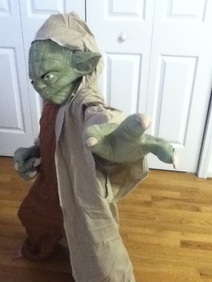
Ready or not, Halloween is coming! My daughter has already picked out her costume. She wants to be Yoda from Star Wars. This suits her. She’s tiny in stature but mighty in spirit. Still, when she goes trick-or-treating this year, she is hoping to be greeted with TREATS, not TRICKS. This makes sense -- how many kids that you know of would look forward to hiking through hilly neighborhoods on Halloween if they thought they were going to get a bunch of nasty tricks rather than treats?
The same is true of reading. If your kids discover they are going to get "tricked" rather than "treated" each time they try to make their way through written text, most will quickly lose interest, and many will stop wanting to read altogether. After all, it won't be fun. It won't even make sense.
It will be confusing. And frustrating. And they won't want to do it.
Can you blame them? Who among us looks forward to doing things that are hard for us...that don't make sense...that confuse us...that make us feel stupid...that scare us...that make the people we love most seem angry and frustrated around us?
Not many, that's for sure.
If you want to make reading more of a "treat" than a "trauma" for your kids, you must prepare them for the words they will encounter on their journeys before you send them out to discover the world of reading on their own. In other words, you must turn the "tricks" they are sure to come across into treats!
To make reading more of a "treat" for your kids, you must teach them more than letters, sounds, and "sight words." You must teach them to blend sounds together, starting on the left and moving to the right. And, equally as important but often overlooked or introduced way too late, you must make sure your kids are equipped to deal with the many "tricks" they are sure to meet along the way -- letters and/or letter combinations that create new sounds when they appear together or in a certain position in words than they normally make when alone. Combinations like sh, ch, th, er, or, ou, tion, oo, aw, ay, etc. And don’t forget “sleepy e,” “2 vowels,” and “le endings.” Y at the end of a short or long word is another doozie you need to remember to teach them. There are many others as well. I’ve counted up to 37 so far, but I’m sure there are more.
One or more of these "tricks" are hiding in almost every word! If you skip this part of their training and rely on teaching "sight words" instead, your kids (especially those with less than stellar visual memories) may just turn to the “dark side” and begin guessing their way through unfamiliar text, saying such things as “why” for very, “tell” for tall, “deserved” for discovered, and/or “admit” for amount. You might even hear them confuse the word I with A! "Had" might become did. "Take" might become like. Such scandalous switches are common among those who have been sent to battle words before they have been adequately trained to even spar with them. They simply don't have the tools or training they need to deal with such skilled adversaries. Before long, one previously "known" word starts looking like the next, and these untrained "readers" either give up or resort to spitting out words from their mental Roladexes each time they see a word with a somewhat familiar letter, shape, or size.
Don't let this happen to your young Jedi. Teach your kids what they really need to know to read the words they will soon encounter -- letters, sounds, “tricks,” a good blending/segmenting technique, and a few common “outlaw words” (words that can’t be sounded out even if you know the “tricks”). If you teach them these skills and give them lots of guided practice using them, you should see your kids' reading habits skyrocket. You should see them turn into excellent readers who get "treated" as they read rather than "tricked." And, as reading the text before them becomes easier and easier, you should see your kids learn to love interacting with books and literature, rather than racing off to avoid them. Or crying. Or complaining. Or throwing a king-sized fit.
Of course, you'll also have to make sure your kids have a good vocabulary, adequate background knowledge, and a few other key reading ingredients. After all, being able to decode words effectively is only the first step. To be real readers, your kids must also be able to understand them!
Regardless of where your kids are today, start giving them the skills they need to move forward. They are counting on you. Don't end their training early and neglect to teach them what they really need to know to read the words around them. Don't send them out to battle a book only halfway prepared.
As my daughter loves to quote from Yoda, "Try not. Do. Or do not. There is no try.”
Train your kids. Teach them what they need to know to be successful readers and writers. Send them out this Halloween and every day thereafter equipped to turn any "trick" into a treat. You won't be sorry.
All the best and much success…and may the Force be with you!
Katy Huller
The same is true of reading. If your kids discover they are going to get "tricked" rather than "treated" each time they try to make their way through written text, most will quickly lose interest, and many will stop wanting to read altogether. After all, it won't be fun. It won't even make sense.
It will be confusing. And frustrating. And they won't want to do it.
Can you blame them? Who among us looks forward to doing things that are hard for us...that don't make sense...that confuse us...that make us feel stupid...that scare us...that make the people we love most seem angry and frustrated around us?
Not many, that's for sure.
If you want to make reading more of a "treat" than a "trauma" for your kids, you must prepare them for the words they will encounter on their journeys before you send them out to discover the world of reading on their own. In other words, you must turn the "tricks" they are sure to come across into treats!
To make reading more of a "treat" for your kids, you must teach them more than letters, sounds, and "sight words." You must teach them to blend sounds together, starting on the left and moving to the right. And, equally as important but often overlooked or introduced way too late, you must make sure your kids are equipped to deal with the many "tricks" they are sure to meet along the way -- letters and/or letter combinations that create new sounds when they appear together or in a certain position in words than they normally make when alone. Combinations like sh, ch, th, er, or, ou, tion, oo, aw, ay, etc. And don’t forget “sleepy e,” “2 vowels,” and “le endings.” Y at the end of a short or long word is another doozie you need to remember to teach them. There are many others as well. I’ve counted up to 37 so far, but I’m sure there are more.
One or more of these "tricks" are hiding in almost every word! If you skip this part of their training and rely on teaching "sight words" instead, your kids (especially those with less than stellar visual memories) may just turn to the “dark side” and begin guessing their way through unfamiliar text, saying such things as “why” for very, “tell” for tall, “deserved” for discovered, and/or “admit” for amount. You might even hear them confuse the word I with A! "Had" might become did. "Take" might become like. Such scandalous switches are common among those who have been sent to battle words before they have been adequately trained to even spar with them. They simply don't have the tools or training they need to deal with such skilled adversaries. Before long, one previously "known" word starts looking like the next, and these untrained "readers" either give up or resort to spitting out words from their mental Roladexes each time they see a word with a somewhat familiar letter, shape, or size.
Don't let this happen to your young Jedi. Teach your kids what they really need to know to read the words they will soon encounter -- letters, sounds, “tricks,” a good blending/segmenting technique, and a few common “outlaw words” (words that can’t be sounded out even if you know the “tricks”). If you teach them these skills and give them lots of guided practice using them, you should see your kids' reading habits skyrocket. You should see them turn into excellent readers who get "treated" as they read rather than "tricked." And, as reading the text before them becomes easier and easier, you should see your kids learn to love interacting with books and literature, rather than racing off to avoid them. Or crying. Or complaining. Or throwing a king-sized fit.
Of course, you'll also have to make sure your kids have a good vocabulary, adequate background knowledge, and a few other key reading ingredients. After all, being able to decode words effectively is only the first step. To be real readers, your kids must also be able to understand them!
Regardless of where your kids are today, start giving them the skills they need to move forward. They are counting on you. Don't end their training early and neglect to teach them what they really need to know to read the words around them. Don't send them out to battle a book only halfway prepared.
As my daughter loves to quote from Yoda, "Try not. Do. Or do not. There is no try.”
Train your kids. Teach them what they need to know to be successful readers and writers. Send them out this Halloween and every day thereafter equipped to turn any "trick" into a treat. You won't be sorry.
All the best and much success…and may the Force be with you!
Katy Huller
Author of Kinders Can! READ and WRITE! and Tricks Practice Cards (Set 1 and Set 2). All available at www.KindersCanReadandWrite.com!)
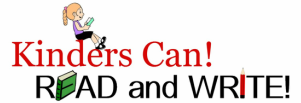
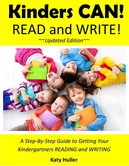
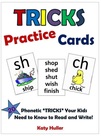

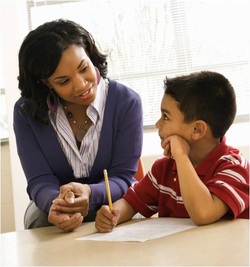
 RSS Feed
RSS Feed
